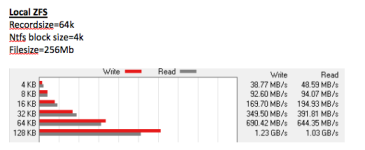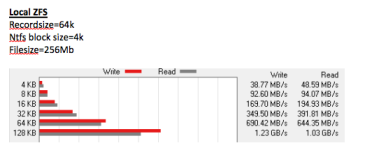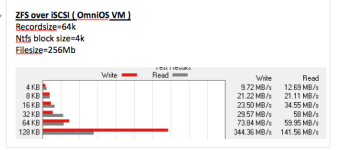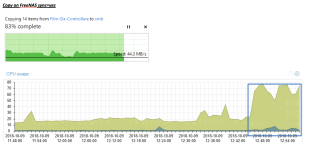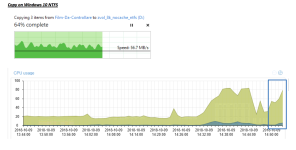Ok I have done others test, using ZFS on Proxmox I'm getting an high IO delay. Just to recap, here my hardware config:
CPU: Intel I5-7400
RAM: 32GB
Network: 2x Intel Gigabit
The config I have been using on the test, is not the final one. In the final solution, I'll have 2 or 3 disks WD RED 4TB in RAID1 or RAIDZ, then I'll use a Samsung EVO 840 256GB for SLOG/L2ARC
For test, I'm using these disks:
Hardisk: 1TB SATA 7200RPM
SSD: Intel SSD 520 180GB
I created 2x zpool:
Name: proxmox
Disk: 1TB SATA 7200RPM
Options: compression=lz4, sync=disabled, atime=off, ashift=12
Dataset: 8k
Name: ssd
Disk: Intel SSD 520 180GB
Option: compression=lz4, sync=disabled, atime=off
Dataset: 8k
I created 2x ZVOL ( 1 for each zpool ) and I attached them to a VM. The VM is an XPEnology ( Synology ) that is using a btrfs on the top of zvol.
Then I created two shared folder over SMB, one for each zvol/zpool.
For the test, I used 14 files ( movie files ) for a total amount of 64GB, copy them from another XPEnology VM on the same server ( no ZFS ) over SMB
I copied the files on the SSD and HDD, as you can show from the follow images:
Screen Shot 2018-10-09 at 12.01.50.png
RED, SSD copy: NO IO Delay
Yellow, HDD copy: High IO Delay
Then, I added the ssd as log to the first pool and I enabled the sync, same behavior, as you can see from the Blue test.
Basically, the server doesn't seems out of resources.. so What can be?
Here the zfs arc info:
Code:
# arc_summary
------------------------------------------------------------------------
ZFS Subsystem Report Tue Oct 09 10:25:34 2018
ARC Summary: (HEALTHY)
Memory Throttle Count: 0
ARC Misc:
Deleted: 96.38M
Mutex Misses: 28.56k
Evict Skips: 957.97k
ARC Size: 10.09% 1.58 GiB
Target Size: (Adaptive) 10.69% 1.67 GiB
Min Size (Hard Limit): 6.25% 1001.74 MiB
Max Size (High Water): 16:1 15.65 GiB
ARC Size Breakdown:
Recently Used Cache Size: 99.81% 1.14 GiB
Frequently Used Cache Size: 0.19% 2.27 MiB
ARC Hash Breakdown:
Elements Max: 2.06M
Elements Current: 9.60% 197.96k
Collisions: 20.88M
Chain Max: 7
Chains: 8.56k
ARC Total accesses: 71.39M
Cache Hit Ratio: 92.45% 66.00M
Cache Miss Ratio: 7.55% 5.39M
Actual Hit Ratio: 92.34% 65.92M
Data Demand Efficiency: 63.38% 13.40M
Data Prefetch Efficiency: 26.91% 343.35k
CACHE HITS BY CACHE LIST:
Most Recently Used: 24.29% 16.03M
Most Frequently Used: 75.59% 49.90M
Most Recently Used Ghost: 0.16% 106.13k
Most Frequently Used Ghost: 0.10% 67.05k
CACHE HITS BY DATA TYPE:
Demand Data: 12.87% 8.49M
Prefetch Data: 0.14% 92.39k
Demand Metadata: 86.97% 57.41M
Prefetch Metadata: 0.02% 13.30k
CACHE MISSES BY DATA TYPE:
Demand Data: 91.01% 4.91M
Prefetch Data: 4.65% 250.96k
Demand Metadata: 4.09% 220.55k
Prefetch Metadata: 0.25% 13.38k
DMU Prefetch Efficiency: 85.74M
Hit Ratio: 7.03% 6.03M
Miss Ratio: 92.97% 79.71M
ZFS Tunables:
dbuf_cache_hiwater_pct 10
dbuf_cache_lowater_pct 10
dbuf_cache_max_bytes 104857600
dbuf_cache_max_shift 5
dmu_object_alloc_chunk_shift 7
ignore_hole_birth 1
l2arc_feed_again 1
l2arc_feed_min_ms 200
l2arc_feed_secs 1
l2arc_headroom 2
l2arc_headroom_boost 200
l2arc_noprefetch 1
l2arc_norw 0
l2arc_write_boost 8388608
l2arc_write_max 8388608
metaslab_aliquot 524288
metaslab_bias_enabled 1
metaslab_debug_load 0
metaslab_debug_unload 0
metaslab_fragmentation_factor_enabled 1
metaslab_lba_weighting_enabled 1
metaslab_preload_enabled 1
metaslabs_per_vdev 200
send_holes_without_birth_time 1
spa_asize_inflation 24
spa_config_path /etc/zfs/zpool.cache
spa_load_verify_data 1
spa_load_verify_maxinflight 10000
spa_load_verify_metadata 1
spa_slop_shift 5
zfetch_array_rd_sz 1048576
zfetch_max_distance 8388608
zfetch_max_streams 8
zfetch_min_sec_reap 2
zfs_abd_scatter_enabled 1
zfs_abd_scatter_max_order 10
zfs_admin_snapshot 1
zfs_arc_average_blocksize 8192
zfs_arc_dnode_limit 0
zfs_arc_dnode_limit_percent 10
zfs_arc_dnode_reduce_percent 10
zfs_arc_grow_retry 0
zfs_arc_lotsfree_percent 10
zfs_arc_max 0
zfs_arc_meta_adjust_restarts 4096
zfs_arc_meta_limit 0
zfs_arc_meta_limit_percent 75
zfs_arc_meta_min 0
zfs_arc_meta_prune 10000
zfs_arc_meta_strategy 1
zfs_arc_min 0
zfs_arc_min_prefetch_lifespan 0
zfs_arc_p_dampener_disable 1
zfs_arc_p_min_shift 0
zfs_arc_pc_percent 0
zfs_arc_shrink_shift 0
zfs_arc_sys_free 0
zfs_autoimport_disable 1
zfs_checksums_per_second 20
zfs_compressed_arc_enabled 1
zfs_dbgmsg_enable 0
zfs_dbgmsg_maxsize 4194304
zfs_dbuf_state_index 0
zfs_deadman_checktime_ms 5000
zfs_deadman_enabled 1
zfs_deadman_synctime_ms 1000000
zfs_dedup_prefetch 0
zfs_delay_min_dirty_percent 60
zfs_delay_scale 500000
zfs_delays_per_second 20
zfs_delete_blocks 20480
zfs_dirty_data_max 3361280819
zfs_dirty_data_max_max 4294967296
zfs_dirty_data_max_max_percent 25
zfs_dirty_data_max_percent 10
zfs_dirty_data_sync 67108864
zfs_dmu_offset_next_sync 0
zfs_expire_snapshot 300
zfs_flags 0
zfs_free_bpobj_enabled 1
zfs_free_leak_on_eio 0
zfs_free_max_blocks 100000
zfs_free_min_time_ms 1000
zfs_immediate_write_sz 32768
zfs_max_recordsize 1048576
zfs_mdcomp_disable 0
zfs_metaslab_fragmentation_threshold 70
zfs_metaslab_segment_weight_enabled 1
zfs_metaslab_switch_threshold 2
zfs_mg_fragmentation_threshold 85
zfs_mg_noalloc_threshold 0
zfs_multihost_fail_intervals 5
zfs_multihost_history 0
zfs_multihost_import_intervals 10
zfs_multihost_interval 1000
zfs_multilist_num_sublists 0
zfs_no_scrub_io 0
zfs_no_scrub_prefetch 0
zfs_nocacheflush 0
zfs_nopwrite_enabled 1
zfs_object_mutex_size 64
zfs_pd_bytes_max 52428800
zfs_per_txg_dirty_frees_percent 30
zfs_prefetch_disable 0
zfs_read_chunk_size 1048576
zfs_read_history 0
zfs_read_history_hits 0
zfs_recover 0
zfs_recv_queue_length 16777216
zfs_resilver_delay 2
zfs_resilver_min_time_ms 3000
zfs_scan_idle 50
zfs_scan_ignore_errors 0
zfs_scan_min_time_ms 1000
zfs_scrub_delay 4
zfs_send_corrupt_data 0
zfs_send_queue_length 16777216
zfs_sync_pass_deferred_free 2
zfs_sync_pass_dont_compress 5
zfs_sync_pass_rewrite 2
zfs_sync_taskq_batch_pct 75
zfs_top_maxinflight 32
zfs_txg_history 0
zfs_txg_timeout 5
zfs_vdev_aggregation_limit 131072
zfs_vdev_async_read_max_active 3
zfs_vdev_async_read_min_active 1
zfs_vdev_async_write_active_max_dirty_percent 60
zfs_vdev_async_write_active_min_dirty_percent 30
zfs_vdev_async_write_max_active 10
zfs_vdev_async_write_min_active 2
zfs_vdev_cache_bshift 16
zfs_vdev_cache_max 16384
zfs_vdev_cache_size 0
zfs_vdev_max_active 1000
zfs_vdev_mirror_non_rotating_inc 0
zfs_vdev_mirror_non_rotating_seek_inc 1
zfs_vdev_mirror_rotating_inc 0
zfs_vdev_mirror_rotating_seek_inc 5
zfs_vdev_mirror_rotating_seek_offset 1048576
zfs_vdev_queue_depth_pct 1000
zfs_vdev_raidz_impl [fastest] original scalar sse2 ssse3 avx2
zfs_vdev_read_gap_limit 32768
zfs_vdev_scheduler noop
zfs_vdev_scrub_max_active 2
zfs_vdev_scrub_min_active 1
zfs_vdev_sync_read_max_active 10
zfs_vdev_sync_read_min_active 10
zfs_vdev_sync_write_max_active 10
zfs_vdev_sync_write_min_active 10
zfs_vdev_write_gap_limit 4096
zfs_zevent_cols 80
zfs_zevent_console 0
zfs_zevent_len_max 64
zil_replay_disable 0
zil_slog_bulk 786432
zio_delay_max 30000
zio_dva_throttle_enabled 1
zio_requeue_io_start_cut_in_line 1
zio_taskq_batch_pct 75
zvol_inhibit_dev 0
zvol_major 230
zvol_max_discard_blocks 16384
zvol_prefetch_bytes 131072
zvol_request_sync 0
zvol_threads 32
zvol_volmode 1
# arcstat
time read miss miss% dmis dm% pmis pm% mmis mm% arcsz c
10:26:57 128 44 34 44 34 0 0 0 0 3.1G 3.1G
Thanks,
Jack



